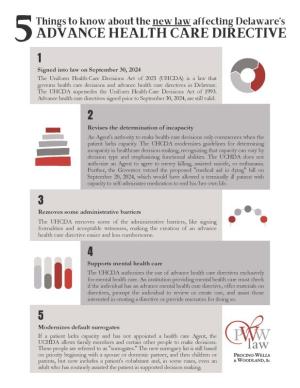Five Things to Know About the New Law Affecting Delaware’s Advance Health Care Directive
Five Things to Know About the New Law Affecting Delaware’s Advance Health Care Directive
1. Signed into law on September 30, 2024, the Uniform Health-Care Decisions Act of 2023 (UHCDA) is a law that governs health care decisions and advance health care directives in Delaware. The UHCDA supersedes the Uniform Health-Care Decisions Act of 1993. Advance health care directives signed prior to September 30, 2024, are still valid.
2. An Agent's authority to make health-care decisions only commences when the patient lacks capacity. The UHCDA modernizes guidelines for determining incapacity in healthcare decision-making, recognizing that capacity can vary by decision type and emphasizing functional abilities. The UCHDA does not authorize an Agent to agree to mercy killing, assisted suicide, or euthanasia. Further, the Governor vetoed the proposed "medical aid in dying" bill on September 20, 2024, which would have allowed a terminally ill patient with capacity to self-administer medication to end his/her own life.
3. The UHCDA removes some of the administrative barriers, like signing formalities and acceptable witnesses, making the creation of an advance health care directive easier and less cumbersome.
4. The UHCDA authorizes the use of Advance Health Care Directives exclusively for mental health care. An institution providing mental health care must check if the individual has an advance mental health care directive, offer materials on directives, prompt the individual to review or create one, and assist those interested in creating a directive or provide resources for doing so.
5. If a patient lacks capacity and has not appointed a health care Agent, the UCHDA allows family members and certain other people to make decisions. These people are referred to as "surrogates." The new surrogacy list is still based on priority beginning with a spouse or domestic partner, and then children or parents, but now includes a patient's cohabitant and, in some cases, even an adult who has routinely assisted the patient in supported decision making.
To learn more about this and other crucial estate planning documents, visit our blog.










































